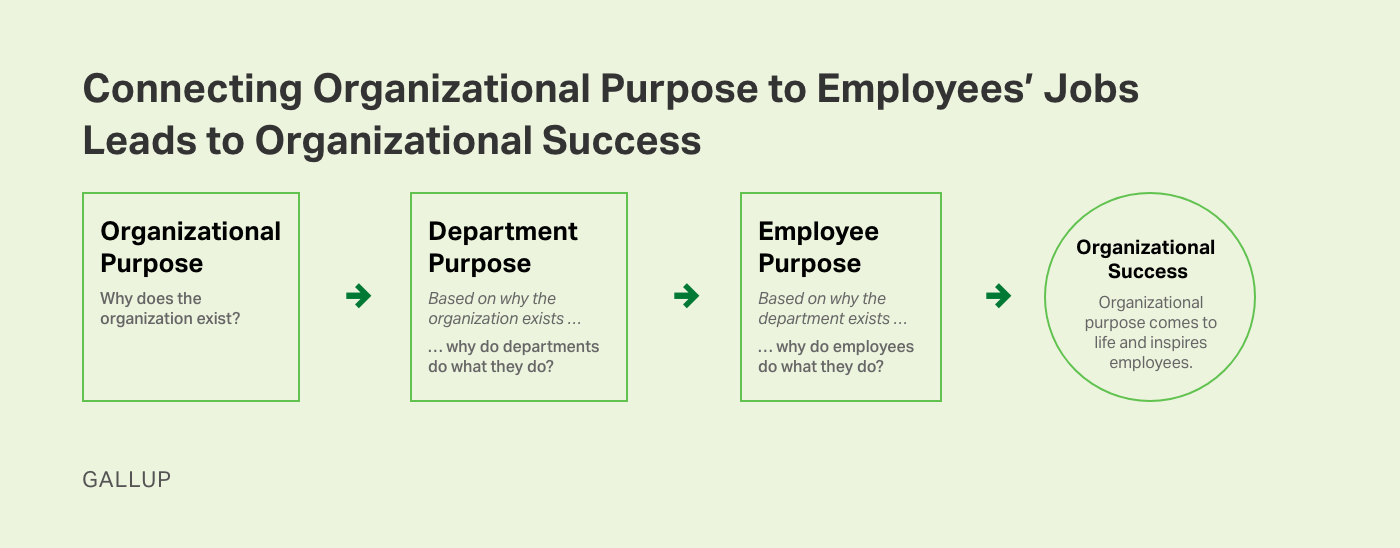Story Highlights
- The focus of corporations has shifted from shareholders to stakeholders
- Employees must feel their job is important and has a greater purpose
- High-purpose firms do better financially than their peers
"Why do you do what you do?"
Most employees cannot give a compelling answer to this question. In fact, Gallup research shows that only 41% of U.S. employees strongly agree that they know what their company stands for and what makes it different from its competitors.
This is particularly relevant given the recent Business Roundtable (BRT) release of its revised Statement on the Purpose of a Corporation on Aug. 19. Since 1997, the BRT had endorsed principles of shareholder primacy, which served as conventional business wisdom since Milton Friedman's 1970 claim that a company's only responsibility is to its shareholders.
The BRT's revised statement, signed by 181 top CEOs, states that businesses should serve all stakeholders rather than focus exclusively on shareholders.
This change marks a significant step toward shifting corporate definitions of purpose. Now, business leaders must operationalize purpose in their companies -- and one of the best ways to do that is to connect the purpose of their organizations to their employees' jobs. In other words, they must help employees compellingly answer the question "Why do you do what you do?"
Connecting Purpose to the Individual
The will is already there -- 79% of business leaders say that an organization's purpose is integral to its success. Leaders value purpose because purpose adds value.
Indeed, in a 2016 study of employees at 429 U.S. companies, researchers found that high-purpose firms in which managers excel at communicating how employees' work contributes to the mission have systemically better financial performance than their peers.
But there's an evident disconnect between purpose and workers' jobs in most businesses: Only four in 10 U.S. employees strongly agree that the mission or purpose of their organization makes them feel their job is important.
If workers don't feel their job is important, they cannot connect it to a larger purpose -- especially those who don't know what their company's purpose is or how it functions in day-to-day operations. Managers, more than anyone else, are the key to helping employees make that crucial connection -- and leaders must help managers do it.
Only four in 10 U.S. employees strongly agree that the mission or purpose of their organization makes them feel their job is important.
Helping managers craft substantive answers will require effort and attention, and leaders must push their managers to move beyond simplistic responses. Indeed, a robust set of answers to this question is the catalyst that transforms purpose statements into real purpose -- and value.
Developing Robust Answers to a Vital Question
Consider the mission of fast-casual restaurant sweetgreen, for example. Its mission is "to inspire healthier communities by connecting people to real food." Leaders could coach managers in sweetgreen's finance department, for instance, to help their people understand that the answer to the question "Why do you do what you do?" is "I help assess and optimize our financial resources so that we are able to connect more people to real food."
There are three primary benefits to developing robust responses to this question:
-
Researchers have found that stock prices are 12 times better among purposeful, value-driven companies than their competitors, so improved performance outcomes may result from better communication regarding purpose.
-
By creating space for dialogue about purpose, leaders gain the employee perspective, thus strengthening their connection to employees.
-
Communication about purpose creates a foundation upon which roles can be built and aligned -- if all departments are operating on the same "purpose foundation," they are much more likely to work synergistically.
The BRT's revised Statement on the Purpose of a Corporation is a significant improvement from Friedman's doctrine. But unless leaders learn how to connect organizational purpose to their employees' jobs, new corporate definitions of purpose, though well-intentioned, will remain platitudes and will not galvanize their people.
However, if leaders help their managers and employees connect the question "Why do you do what you do?" to the organization's purpose, the Business Roundtable's new purpose statement will increasingly come to life and create commensurate value.

Gallup can help connect your corporate culture to your employees' roles:
- Improve business outcomes and explore Gallup's employee engagement insights and solutions.
- Learn whether your employees can answer the question "Why do you do what you do?" with Gallup's Q12 employee engagement survey.
- Build your ideal culture, one where employees feel their jobs matter and can connect to the greater corporate purpose.






